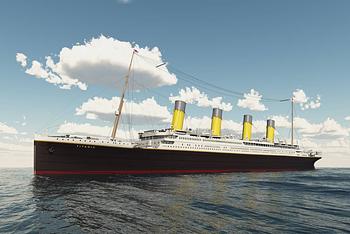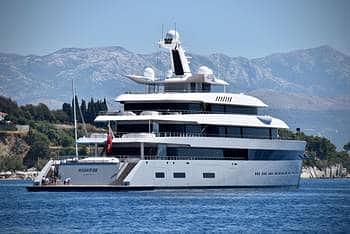Have you ever thought about swapping the solid foundations of a house for life on a canal boat? An estimated 20,000 people now live on Britain’s waterways, a figure which doubled in the last decade. More and more people are making the lifestyle change, opting for the simpler life, more at one with nature. But is there a financial advantage to living on a boat too?
The UK, like many countries around the world, is seeing a huge rise in the cost of living on the back of the COVID-19 pandemic. Everything from council tax to groceries, energy bills and fuel has gone up and many people are feeling the strain. Families are looking for ways to beat the cost of living crisis, by cutting back on luxuries, budgeting differently or taking on more hours at work. But some people however, are looking for a very different solution and taking to life on the water. While sail boats and motorboats offer more flexibility in where you can go, canal boats and narrow boats provide more of a home from home vibe. Here we take a look at whether living on a canal boat can help you beat the cost of living problems.
How Much Does a Canal Boat Cost to Buy in the UK?
The biggest expense when making the move to a life on the water is the initial purchase cost of the boat. As with all boats for sale, how much it costs to buy a canal boat depends on the size and condition of the boat. New canal boats cost in the region of £1,000 per foot – although that figure will depend on the finish and accessories included – so you could own your very own brand new floating home for £50,000 for an averaged sized 50 foot boat. When you compare that figure to the average cost of a house of around £250,000, it’s just 20% of the cost.
The same is true for used canal boats, with prices for 50 foot boats in the region of £30,000, or 40 foot boats around £25,000. Bargains can be found for much less though if you’re willing to do some work to get it shipshape.
Getting Finance to Buy a Boat
How you finance your boat is the next thing to consider. If you have saved and can buy your boat outright, your monthly outgoings will be considerably less. If you need financing however, you’ll need to factor those repayments into your monthly budget.
Financing a boat is generally the same as getting a mortgage on a house, however the terms of the lending agreement will likely be much shorter, usually up to 10 years, and interest rates are not as favourable as with house mortgages. Find out more with our guide to marine mortgages, or you could look into securing a personal loan to make your purchase.
While taking out a loan or marine mortgage might not give you the same rates as a house mortgage, you’re working with much smaller figures. Rather than getting a mortgage for £200,000 or more over 25 years, you’ll be taking out a loan of between £25,000 and £50,000 paid off over a much shorter time frame.
Monthly and Annual Costs of Living on a Boat
When it comes to living on a boat full time, there are a certain monthly and annual expenses that will need to be factored in. These include:
Mooring fees: A residential mooring fee is probably the most expensive outgoing on the list and can be between £1,800 and £3,000 per year depending on the size of the boat and the location. Marinas in Central London may charge considerably more than this however and be as much as £10,000 or more. While this may seem a lot, compared to rents which start at around £850 to £1,200 per month for a one bedroom flat (upwards of £3,000 in London), the saving is enormous.
If however, you aren’t tied to a single place, for work or children’s schools for example, you could opt not to have a full-time mooring and save on the fees. If you move your boat at least every two weeks you won’t need to pay residential mooring fees or council tax. There are an estimated 5,000 boat owners doing this in the UK.
Council Tax: If you have a residential mooring you will need to pay council tax Band A which, depending on the area, could be around £1,200 per year. This will be equivalent to the council tax on a flat. A small terraced home would likely be in Band B, a semi-detached in Band C and a detached in Band D, with annual costs going up to as much as £2,000 per year.
Electricity, LPG Gas, Water and Pumping Out: Keeping your boat connected to electricity, heated with LPG gas (or using a wood burning stove) and running water (as well as the pump out of the waste holding tank) will be added to your residential mooring fee and will be the same rates as for houses. However, the smaller size of a boat will mean you use less energy and therefore there are savings to be had.
Boat Licences: Any vessel, whether it’s a paddle board or a barge boat, needs to have a boat licence to operate on Britain’s inland waterways. Licences vary in cost depending on the size of the boat and can be around £500-1,000 a year for a water licence. They must be paid whether you have a residential mooring or are nomadic.
Boat Safety Certificate: This is equivalent to the MOT for a car and costs around £200 ever four years.
Boat Insurance: You must legally have a minimum of third party insurance to operate your boat on inland waterways in the UK. Prices start at around £250, but you might want to consider taking out a content insurance too to protect your lovely new home and everything in it.
Maintenance Costs: Keeping your boat shipshape is important and you’ll need a basic maintenance plan for the year and to keep on top of jobs which need doing. You’ll probably be able to do most of them yourself, which will keep the costs down, but as with a house, factor in a few hundred pounds a year for maintenance and replacement of broken items.
The Bottom Line
When we take all of these factors and figures into account, there are clear and massive financial savings to be found in living on a boat versus living in a house. But life on the water isn’t for everyone, and you will need to weigh up the pros and cons of living on a boat before making such a big lifestyle change. For those finding it difficult to get on the property ladder, or if you’ve found yourself asking the question, where is the best place to live with low cost of living? Then perhaps that place is on the water.
Head over to Rightboat.com and see all our canal boats for sale. Your dream could easily become a reality as you embark on a new lifestyle and adventure along Britain’s beautiful inland waterways.


